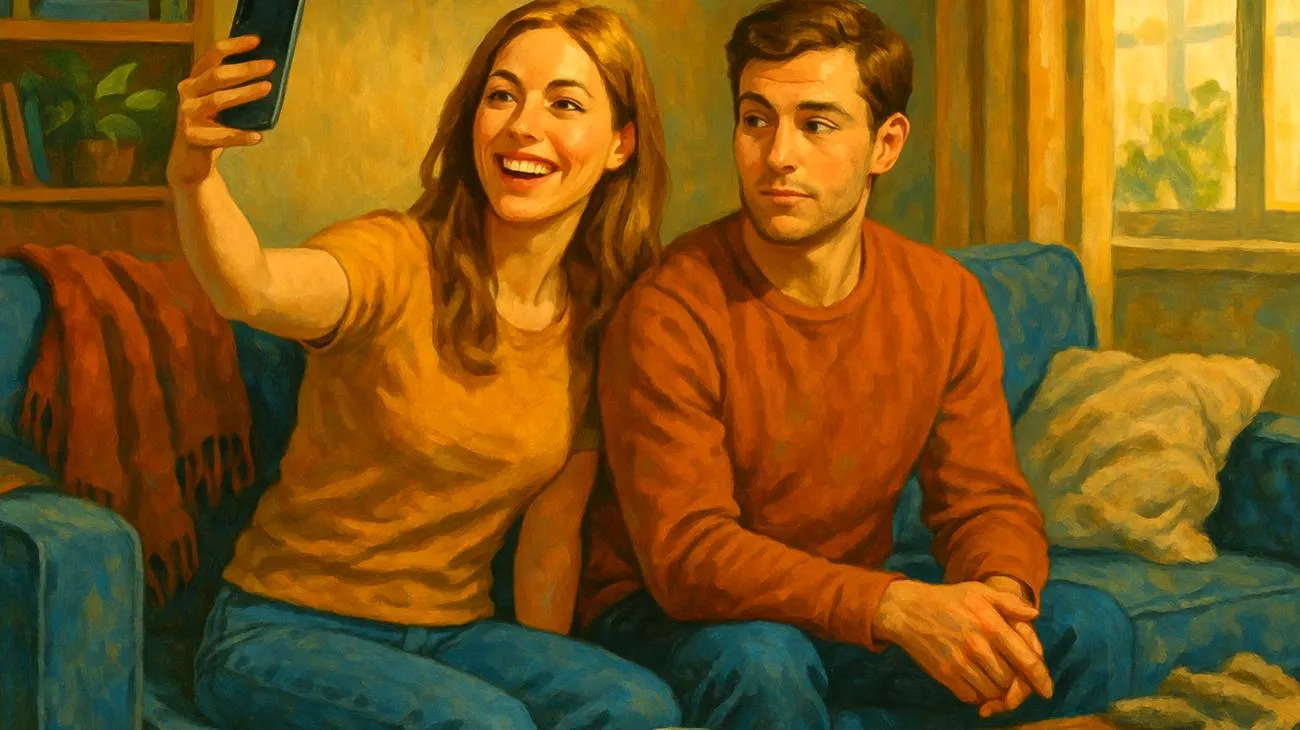We’ve all seen that couple. You know the one – they’re practically glued to each other in every Instagram story, posting romantic dinner dates that look straight out of a magazine, and writing captions so sweet they could give you diabetes. But here’s the plot twist that might blow your mind: behind all those perfectly curated posts could be a relationship that’s barely surviving in the real world. Welcome to the wild, slightly terrifying world of digital-only love, where romance thrives in the comment section but dies a slow death face-to-face.
If you’ve ever wondered whether your relationship has more substance on your phone screen than in your actual living room, you’re definitely not alone. Psychology experts are sounding the alarm about couples who seem to perform their love for an audience rather than actually living it together. It’s like being trapped in your own romantic reality show, except the cameras never stop rolling and the real connection gets lost somewhere between the ring light and the perfect angle.
The Mind-Bending Psychology Behind Digital Love Theater
Let’s get something straight right off the bat: there’s absolutely nothing wrong with sharing your happiness online. The problem starts when creating that digital highlight reel becomes more important than the actual relationship happening behind the scenes. A staggering 59% of young people report that social media negatively impacts their in-person connections. That’s more than half of an entire generation struggling to balance their online personas with authentic, messy, beautiful human intimacy.
Psychologists have a fancy name for what’s happening here: the Hyperpersonal Model. Basically, social media platforms are like emotional Instagram filters – they encourage us to present the most polished, sparkly versions of ourselves and our relationships. Everything looks absolutely perfect online, but the raw, complicated, wonderfully imperfect reality of human connection gets smoothed right out of existence.
Here’s where it gets really interesting. Research shows that frequent social media use is directly linked to what experts call selective self-presentation. In plain English? You’re not actually sharing your relationship – you’re sharing a carefully edited highlight reel that has about as much resemblance to your daily reality as a movie trailer has to the actual film.
Major Red Flags That Your Love Life Has Gone Full Digital
So how do you know if your relationship has crossed the line from healthy sharing into full-blown performance art? The warning signs are sneakier than you might think, but they’re definitely there once you know what to look for.
- You’re More Articulate in Captions Than in Conversations: If writing a romantic Instagram post feels easier than saying “I love you” while looking directly into your partner’s eyes, that’s a red flag doing backflips in the digital wind.
- You Learn About Your Partner’s Life Through Their Stories: Discovering your partner’s major life updates through their social media posts rather than direct conversation is a classic sign of emotional distance.
- Your Arguments Are About Posts, Not Real Issues: When your biggest fights center around who liked what or why someone didn’t post about your anniversary, you’ve officially entered relationship danger territory.
- Private Moments Feel Incomplete Without Documentation: If the idea of having a quiet, unposted moment together feels weird or somehow less valid, that’s your brain sending up warning flares.
These patterns reveal something crucial about modern relationships. Healthy connections absolutely need sacred, private spaces that exist just for the two people involved – no audience, no likes, no comments required. When everything becomes content, nothing remains genuinely intimate.
The Comparison Trap That’s Poisoning Modern Love
Here’s where things get psychologically fascinating and slightly depressing. Social Comparison Theory explains why relationships that live primarily online often feel unsatisfying despite all those heart emojis and fire reactions. When you’re constantly bombarded with other couples’ highlight reels, your own perfectly normal, beautifully imperfect relationship starts to feel inadequate.
This phenomenon creates unrealistic expectations and trust issues in romantic partnerships. It’s like trying to measure your relationship’s health with a thermometer that only shows other people’s best days – you’re never going to get an accurate reading of your own situation. The pressure to present a relationship that looks perfect can be absolutely overwhelming, especially when you’re performing for multiple audiences with completely different ideas about what love should look like.
What’s Really Happening Behind All Those Perfect Posts
So what’s actually going on beneath all those couple selfies and anniversary celebrations? Often, it’s a case of emotional avoidance wearing a really convincing disguise. When couples focus primarily on their digital presence, they might be unconsciously running away from the harder, less photogenic work of building genuine intimacy.
Here’s the thing about digital connections that researchers are just starting to understand: emotions might spread easily online, but studies reveal that couples experience decreased quality time with their significant other when screens dominate their interactions. Those tiny micro-expressions when someone’s upset, the way their voice changes when they’re excited, the comfort of physical presence during difficult conversations – none of that magic translates through a screen.
Think about it this way: posting a cute couple photo might give you a temporary happiness boost from all those likes and fire emojis, but it doesn’t help you navigate the conversation about whose turn it is to take out the trash or how to handle disagreements about money. The digital high is absolutely real, but it’s also temporary and ultimately about as nourishing as cotton candy.
Breaking Free From the Digital Love Prison
The good news that might save your sanity? Recognition is genuinely the first step toward change. If you’ve been nodding along to this article with a growing sense of horror, don’t panic – awareness is actually a sign of emotional maturity, not relationship doom.
Start with something small that won’t send you into digital withdrawal. Try having one completely unposted date per week. Put both phones in a different room and focus on actually seeing each other. It might feel incredibly awkward at first – like you’re forgetting to document something earth-shatteringly important – but that discomfort is actually your relationship muscles remembering how to work without digital assistance.
Practice having vulnerable conversations without the safety net of a screen. Share something that would never make a good Instagram story – your actual fears about the future, your boring day-to-day concerns, your unglamorous but genuine feelings about your relationship. Real intimacy lives in these unfiltered, decidedly non-aesthetic moments.
Finding the Sweet Spot Between Digital and Real
Here’s the crucial nuance that often gets completely lost in discussions about social media and relationships: the goal isn’t to eliminate digital sharing entirely. Healthy couples can absolutely enjoy posting about their relationship and celebrating their love online. The key is ensuring that your digital expression enhances rather than replaces real-world connection.
Research consistently shows that couples who use social media as a complement to – not a substitute for – face-to-face intimacy report much higher satisfaction levels. It’s all about proportion and intention. Are you posting because you’re genuinely happy and want to share that joy with people you care about? Fantastic! Are you posting because you need external validation to feel secure in your relationship or because you’re trying to convince yourself that everything’s fine? That might be worth some serious examination.
Building Real Love in Our Hyperconnected World
Understanding the psychology behind digital-only relationships isn’t about judgment or shame – it’s about awareness and choice. In our hyperconnected world, it’s completely natural for relationships to have digital components. The challenge is maintaining the delicate balance between our online selves and our authentic, private connections with the people we love most.
Here’s something that might change your perspective entirely: the most meaningful moments in your relationship probably won’t make good social media content – and that’s exactly what makes them precious and real. The quiet Sunday mornings when you’re both slightly grumpy and haven’t brushed your teeth yet, the way you handle stress together when everything’s falling apart, the boring but essential conversations about budgets and future plans – this is where real love actually lives and grows.
Your relationship deserves to exist in three full dimensions, not just in the flat, filtered world of social media. While there’s absolutely nothing wrong with sharing your happiness online, make sure there’s substantial, authentic happiness to share offline too. Because at the end of the day, likes and comments can’t hold you when you’re upset, can’t make you laugh until your sides hurt, and definitely can’t grow old alongside you through all of life’s beautiful, messy, unpostable moments.
Table of Contents

